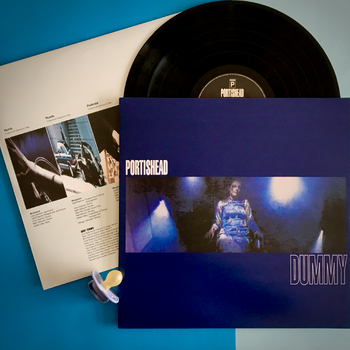PACIFIER
Author: Bruce Jenkins Date Posted:3 November 2023

As it slinks towards its thirtieth anniversary in August 2024, Portishead’s debut album Dummy stands as a cool, arresting record that has lost none of its heartbreaking ambience three decades on.
Composer, producer and DJ Geoff Barrow signed up for a work-for-the-dole scheme in Margaret Thatcher’s Britain. If you roughed out a business plan and stumped up a thousand quid of your own money you could get the princely sum of forty pounds a week as 'unemployment' benefit. Edging along this narrow fiscal ledge Barrow met singer Beth Gibbons. They began recording ideas in Neneh Cherry’s kitchen and a studio in their home town of Bristol. It was here Barrow met Adrian Utley, a jazz guitarist who had played with legendary drummer Art Blakey and soul-jazz organist Big John Patton before branching out into film and production work.
Utley was a collector of unusual instruments, Barrow at the cutting edge of DJ techniques and sampling, and Gibbons a songwriter/lyricist. This unlikely trio became Portishead.
Although they deployed hip-hop devices such as scratching and looping and used existing samples—an excerpt of Lalo Schifrin’s "The Danube Incident" is part of "Sour Times," for example—Portishead also created their own samples. This artisan process saw them recording original music onto vinyl which they then sampled via turntable manipulation. Not content with this multilayered approach, the musicians even 'distressed' their own vinyl records by purposely scuffing and damaging the playing surface, something to bring a chill to the heart of any audiophile record collector. (If that is you, gently reader, look away now.) According to Geoff Barrow they did this by "putting them on the studio floor and walking across them and using them like skateboards" (ref: Wiki). The vintage sound thus produced gives the record a strange era-hopping feel. Some moments are gothic trip-hop, others Sixties spaghetti western; here a tense spy theme, there a post-apocalyptic torch song. Yet although the rhythmic sounds forming the bedrock of Dummy are varied, the sound is consistent throughout the ten tracks due largely to the unique, understated vocals of Beth Gibbons. Her voice sets the mood, and the mood is downbeat.
Filmic opening track "Mysterons" offers a croaking seagull-dog beat and swaying theremin (misspelled on the inner sleeve) before Gibbons’ enters, languid yet impassioned; All for nothing / Did you really want?
"Sour Times" is next, a big brassy sound with rattling snare drum and tasty guitar work from Adrian Utley. The trick with sampling is to reconfigure the source material into something new and engaging. Portishead succeed admirably, as further evidenced by "Wandering Star" which integrates War’s "Magic Mountain" with a mesmeric bass pulse and an almost upbeat vocal. Almost.
"Numb" was the lead single from the LP, released in June 1994. A woozy organ and death-knell chime lead into an eerie groove that manages to be both laid back and tense. It is these apparent contradictions that make Dummy such a rewarding listen. You can, of course, set the volume to a muttering lounge level suitable for sipping cocktails, but the album offers so much more when cranked up. Final track "Glory Box" provides a potent example. Gibbons’ vocal burns, Utley does beastly things to his guitar, while the descending bass line keeps things hypnotically atmospheric.
Atmospheres abound on Dummy; light, dark; oppressive, airy; bleak, sensual; stimulating, pacifying. Rolling rhythmic landscapes and concise solos, familiar beats and unique textures. There is, one might say, plenty to chew on.
© Bruce Jenkins—November 2023

